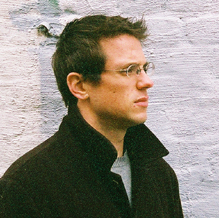 Sunday, October 30, 2005
Sunday, October 30, 2005
Revolution 3
By now, we've realized that the web has changed the topography of today's music scene. It's taken classical music and new music (the punk rockers of classical music) a little more time than the popular music industry to realize this, but I think most understand the importance of this movement in terms of getting your music heard whether you are a composer or performer, building a loyal fan base, and staying in touch. Some have chosen to harness this power and some have not. Lest those who haven't need any more convincing, here are a few quotes from an article about MySpace.com in this month's WIRED magazine:
"For this generation of musicians, the mass market and the hit-making apparatus it supports are relics of a bygone age. The new reality is that their audience isn't listening to radio or vegging out in front of MTV. The audience is online."
. . . the virtue of blogging:
"By frequently updating their blog and swapping in new songs on their page, the Hawthorne Heights guys were able to give fans a reason to return [italics mine]. That increased the online buzz, and the fan club grew fast, eventually, topping 200,000--a direct marketing list that any major-lavel act would kill for."
. . . the impact:
"But whether MySpace ultimately succeeds or fails is beside the point. Its dramatic emergence is the first conclusive evidence of a new era in which the distance between audience and artist is greatly diminished."
I don't have any illusions. Classical and new music will never rise to the popularity of indie rock or popular music. That's not to say that these strategies won't help us reach a wider audience online. MySpace might not be the answer for us--a lot of the pages look very cookie-cutter, and now that it's emerging from the underground, the culturati may deem it passť (especially since Rupert Murdoch owns it now). No matter, take the idea of MySpace--delivering all the stuff that's cool to do online on one site (Friendster, Blogger, MP3, craigslist)--and do your own thing with it. But while I'm working on those changes to my site, I set up a profile on MySpace Music.
posted by Brian Sacawa
11:27 AM
|
|
 Praised by The New York Times as "an inventive musician . . . fresh and surprising," saxophonist Brian Sacawa has firmly established himself as an important contemporary voice for his instrument. He is active as a soloist, recitalist, and chamber musician throughout the United States and is the co-founder of the new music duo Non-Zero with percussionist Timothy Feeney.
Praised by The New York Times as "an inventive musician . . . fresh and surprising," saxophonist Brian Sacawa has firmly established himself as an important contemporary voice for his instrument. He is active as a soloist, recitalist, and chamber musician throughout the United States and is the co-founder of the new music duo Non-Zero with percussionist Timothy Feeney.
He has given premieres of over thirty works by both established and emerging composers, including Michael Gordon, Bright Sheng, Andrew Mead, Oliver Schneller, Ken Ueno, Beata Moon, Hillary Zipper, and Scott McAllister, among many others. Named the Baltimore CITYPAPER’s Critic’s Choice for Classical Music in 2002, he is the recipient of awards for solo performance from both national and international competitions.
Sacawa's versatile career has led to appearances with the St. Petersburg Philharmonic, the Detroit Symphony Orchestra, the New World Symphony, Harvard Group for New Music, New Music Brandeis, Bargemusic, and at meetings of the ISU Contemporary Music Festival, World Saxophone Congress, North American Saxophone Alliance, and New England Saxophone Symposium.
Brian holds degrees from the University of Michigan, the Peabody Conservatory, and the University of Massachusetts – Amherst, where he studied with Donald Sinta, Gary Louie, and Lynn Klock. He has recorded for the Equililbrium, Naxos, and BiBimBop recording labels.
See Brian's other blog
Sounds Like Now
| |



